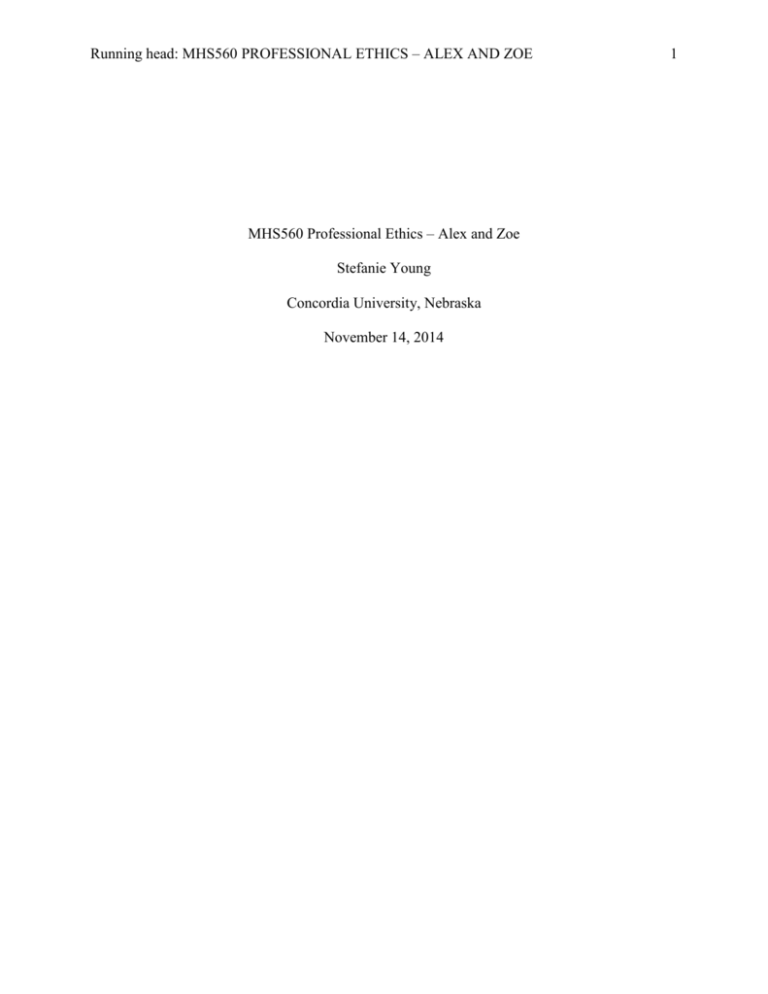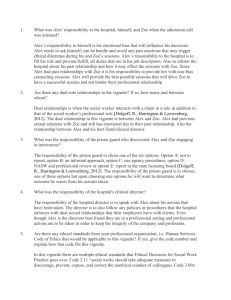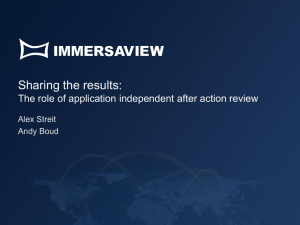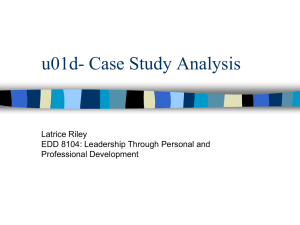
Running head: MHS560 PROFESSIONAL ETHICS – ALEX AND ZOE
MHS560 Professional Ethics – Alex and Zoe
Stefanie Young
Concordia University, Nebraska
November 14, 2014
1
MHS555 PROFESSIONAL ETHICS – ALEX AND ZOE
2
MHS560 Professional Ethics – Alex and Zoe
Week Four – Discussion Question One: Alex and Zoe
Summary of Vignette:
Alex is a Human Services worker in Massachusetts. He works in a state mental hospital, working
solely with patients who have been deemed not guilty by reason of insanity (NGRI). Alex is
informed by admissions that he will be receiving another NGRI patient; a 27-year-old Caucasian
female named Zoe Taylor, who has AIDs but has not been able to receive any medical services.
He immediately recognizes the name as an old girlfriend of two years, with whom he had a
sexual relationship that ended four years ago.
Zoe has murdered her husband by shooting him point blank in the chest with a shotgun in front
of her son. She shot him because he has been cheating on her with multiple partners. Because
Alex was once involved with Zoe and still has unresolved feelings for her, he immediately sets up
a transfer for Zoe to be held at the local county jail. Alex never informed his supervisor of his
prior relationship with Zoe. Alex goes to see Zoe in the prison three days per week to discuss her
case and to have sex. Alex too has AIDS which no one knows about.
A prison guard walks in on Alex and Zoe in the act of intercourse and reports the behavior to
Alex's supervisor at the hospital. Alex's supervisor is the clinical director of the hospital and
Alex's best friend. He feels Alex made an error in judgment that can be dealt with in supervision,
thus no report of sexually inappropriate behavior on the part of Alex was ever reported.
Question #1: What was Alex’s responsibility to the hospital, himself, and Zoe when the
admission call was made?
In my opinion, Alex should have immediately informed the Supervisor of the
Massachusetts’ State Mental Hospital, by which he is employed, of his previous sexual
relationship (as well as unresolved personal feelings) with their facility’s newly accepted “Not
Guilty By Reason of Insanity (NGRI) patient, Zoe Taylor. This simple act of honesty and
integrity would have adequately met his duty and responsibilities as a social worker per the
mandated Code of Ethics, his professional code of ethics directed by his employed organization,
and his own general-ethical standards. If Alex would have informed his supervisors of the
potentiality for conflict, his organization A) could have assigned another social worker to Zoe’s
case, located in a wing of the hospital that Alex does not serve; or B) transferred Zoe to another
State Mental Hospital that accepts and has the ability to care for NGRI patients. Instead, Alex
acted against the Social Worker’s Code of Ethics, as well as his institutions professional code of
ethics, by transferring Zoe back to prison without informing any higher members of authority
about his decision making and/or the reasoning behind it. Alex also cheated Zoe out of her
chance to receive treatment for her issues at an actual mental facility – which the court deemed
necessary. To make matters worse, Alex visited Zoe three times a week at the prison, in a client
to social worker representation – whilst at the same time engaging in sexual relations with her.
MHS555 PROFESSIONAL ETHICS – ALEX AND ZOE
3
At this point, Alex’s actions are not only unethical, but also illegal. In addition, both client and
professional have AIDS, which no other party involved has knowledge of.
Question #2: Are there any dual-role relationships in this vignette? If so, how many and between
whom?
In my opinion, the simplest dual-role relationship in which to describe of this vignette, is
the close friendship between Alex and his direct Supervisor, who also happens to be the Clinical
Director of the Massachusetts’ State Mental Hospital. It was due to this inappropriate dual-role
relationship that the Clinical Director, upon learning of Alex’s outrageously unethical and illegal
behavior, decided to not report it on a criminal level, and instead dealt with the matter “in
house”.
In my opinion, a more complicated situation presents itself between Alex and Zoe. I feel
that Alex and Zoe could be considered to have had a dual-role relationship when Alex first
learned that Zoe was going to be admitted to the facility of which he is employed at as a social
worker, due to the fact that they had dated each other in the past. However, at the point in this
case scenario in which Alex decided to approach the situation in every unethical manner that was
possible, it became a conflict of interest. Specifically, a dual-role relationship can be defined as,
“the social worker interacts with a client in a role in addition to that of the social worker’s
professional role”; whereas, a conflict of interest can be described as, “occurs when a social
worker advances her own interest or the interests of others in ways detrimental to client’s or
other’s interests” (Dolgoff, Harrington, & Loewenberg, 2012, p. 125).
Question #3: What was the responsibility of the prison guard who discovered Alex and Zoe
engaging in intercourse?
As per the vignette’s description, when the prison guard walked in on Alex and Zoe in
the act of sexual intercourse, he reported it to Alex’s Supervisor at the State Mental Hospital. I
do hope that the prison guard interrupted and put a stop to the sexual act as soon as he witnessed
it; as I would believe that it is also his responsibility to protect the inmates to whom he is
assigned. The provided description also leaves me to question if the prison guard appropriately
notified his proper Chain of Command of the incident, or just went ahead himself and informed
Alex’s Supervisor – which would seem to me to be a bit out of odds. I believe that the prison
guard should have first removed Alex from the cell upon seeing this act, then informed his own
Supervisor of what he had witnessed, who in turn would have reported it to the warden – at
which point the appropriate legal steps against Alex could have been initiated. The prison guard
has a responsibility to himself, the organization by which he is employed, the inmates whom it is
his duty to protect, and to the law.
Question #4: What was the responsibility of the hospital’s Clinical Director?
MHS555 PROFESSIONAL ETHICS – ALEX AND ZOE
4
As per the required text, “social work administration and supervisors have an ethical
responsibility to protect client’s rights and to foster an atmosphere in which workers will do the
same” (Dolgoff, Et Al., 2012, p. 210). Alex’s Clinical Director, unfortunately, did neither in this
presented case scenario. By only dealing with Alex’s actions in an “in house” manner, instead of
informing the required authorities, he left Zoe in a victim-state; which is both unethical and
criminal. Sadly, Alex took advantage of Zoe on many levels – especially since there is some
manner of obvious mental impairment involved, as is evident by the court’s ruling of “Not Guilty
By Reason of Insanity”. In addition, by not reprimanding Alex appropriately, Alex may assume
that his Clinical Director is condoning his behavior. This lack of consequence also sends a
terrible message to the organization’s other employees. If word gets out into the community, not
only will the reputation of the facility suffer drastically, but also all members of authority will
have to answer to the National Association of Social Work (NASW), as well as to the law in
hiding a criminal offense. “Social workers should take adequate measures to discourage,
prevent, expose, and correct the unethical conduct of colleagues (NASW Code of Ethics 2.11
a,b,c,d)” (Dolgoff, Et Al., 2012, p. 211).
Question #5: Are there any ethical standards from your professional organization (Human
Service’s Code of Ethics) that would be applicable to this vignette?
I believe that the following NASW Code of Ethics can be directly applied towards Alex’s
decisions and behaviors:
(1.09a): “Social workers should under no circumstances engage in sexual activities or sexual
contact with current clients, whether such contact is consensual or forced.”
(1.09d): “Social workers should not provide clinical services to individuals with whom they have
had a prior sexual relationship.”
(1.06c): “Social workers should not engage in dual or multiple relationships with clients or
former clients in which there is a risk of exploitation or potential harm to the client” (Dolgoff, Et
Al., 2012, p. 128).
I also believe that Alex’s Supervisor/Clinical Director also went against several ethical
standards mandated by the Human Service’s Code of Ethics. For example:
(2.11 a,b,c,d): “Social workers should take adequate measures to discourage, prevent, expose,
and correct the unethical conduct of colleagues” and
(1.01): “Social workers’ primary responsibility is to promote the well-being of clients” (Dolgoff,
Et Al., 2012, p. 211).
MHS555 PROFESSIONAL ETHICS – ALEX AND ZOE
5
REFERENCES
-
Dolgoff, R; Harrington, D; & Loewenberg F.M. (2012). “Ethical Decisions for Social Work
Practice.” Brooks/Cole Cengage Learning; Belmont, CA.










